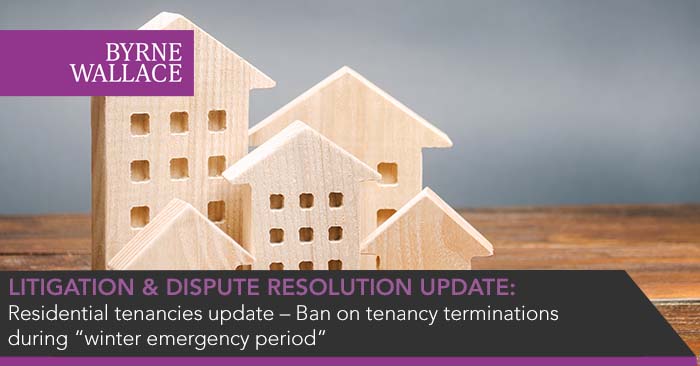Residential tenancies update – Ban on tenancy terminations during “winter emergency period”
Wednesday, 02 November 2022
The government has introduced emergency measures, which prevent residential tenancies being terminated over the winter period to March 2023 and beyond in certain circumstances. These measures were introduced by the Residential Tenancies (Deferment of Termination Dates of Certain Tenancies) Act 2022 (the “Act”). Tenants may only avail of the protections in the Act, where they have complied with their tenancy obligations.
Deferred termination dates
The principal focus of the Act is to defer termination dates until after the “winter emergency period”. The winter emergency period runs from 30 October 2022 to 31 March 2023. The measures introduced mean that where a notice of termination specifies a termination date that falls within the winter emergency period, a “deferred termination date” applies instead (see table). These deferred termination dates also apply to the outcome of landlord and tenant disputes heard by the Residential Tenancies Board (“RTB”). If a termination date in a RTB determination order falls within the winter emergency period, the relevant deferred termination date will apply instead.
| Period during which termination date falls | Tenancy duration | Deferred termination date | |
| 1. | 30 October 2022 – 31 January 2023 | Less than 6 months | 1 May 2023 |
| 2. | 1 February 2023 – 31 March 2023 | Less than 6 months | 18 June 2023 |
| 3. | 30 October 2022 – 31 January 2023 | 6 months – less than 1 year | 1 May 2023 |
| 4. | 1 February 2023 – 31 March 2023 | 6 months – less than 1 year | 1 June 2023 |
| 5. | 30 October 2022 – 31 January 2023 | 1 year – less than 7 years | 15 April 2023 |
| 6. | 1 February 2023 – 31 March 2023 | 1 year – less than 7 years | 1 May 2023 |
| 7. | 30 October 2022 – 31 March 2023 | 7 years + | 1 April 2023 |
The “deferred termination date” that applies in each case depends on the length of the tenancy and when in the winter emergency period the original termination date fell. For example, if a landlord served a notice of termination to end a tenancy that was 12 months old and the termination date stated in that notice was 1 January 2023, the tenant will now not be required to leave the rented property until 15 April 2023 (see row 5 of the table).
Additional measures for tenancies less than 6 months old
The Act introduces additional measures for tenancies that are less than 6 months old, where a landlord serves a notice of termination to end that tenancy during the winter emergency period (i.e. the notice of termination is served at any stage between 30 October 2022 and 31 March 2023 inclusive). In these cases, the termination date that a landlord must set out in the notice of termination cannot be earlier than 18 June 2023.1 If an earlier date is stated, the notice of termination will be invalid.
The operation of the Act in this context (and in any case where a deferred termination date applies) does not give rise to security of tenure rights for tenants.
Exceptions
The protections given to tenants under the Act do not apply where a tenant has breached his/her tenancy obligations. For example, if a tenant has failed to pay rent or has engaged in anti-social behaviour, the tenant must vacate the rented property on the termination date, even if it falls within the winter emergency period. In addition, the protections do not apply where a landlord serves a notice of termination on the basis that the accommodation is no longer suitable for the accommodation needs of the occupying household.
Service of notices of termination can continue
Landlords can still serve a notice of termination as normal during the winter emergency period. The Act does not prohibit this. However, as stated above, if the tenancy is less than 6 months old and being terminated for a reason other than breach of obligation, the notice of termination must state a termination date that is no earlier than 18 June 2023.
If a tenant receives a notice of termination and disputes it, the usual timelines within which a tenant must refer a dispute to the RTB also apply. Accordingly, if a tenant disputes a notice of termination served on the basis that a tenant had breached his/her tenancy obligations, that dispute must be referred to the RTB within 28 days from receipt of the notice. If the notice of termination is served for a reason other than a breach of obligation (e.g. a landlord wants to sell) the tenant must refer any dispute in relation to the notice to the RTB within 90 days.
For further information please contact Valerie Hourigan, Gráinne Murphy or Jennifer Ring in the Byrne Wallace Shields LLP Litigation and Dispute Resolution Team.
1 The requirement to give a minimum notice period of 90 days to terminate a tenancy that is less than 6 months old still applies.

